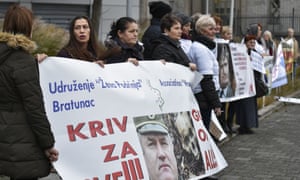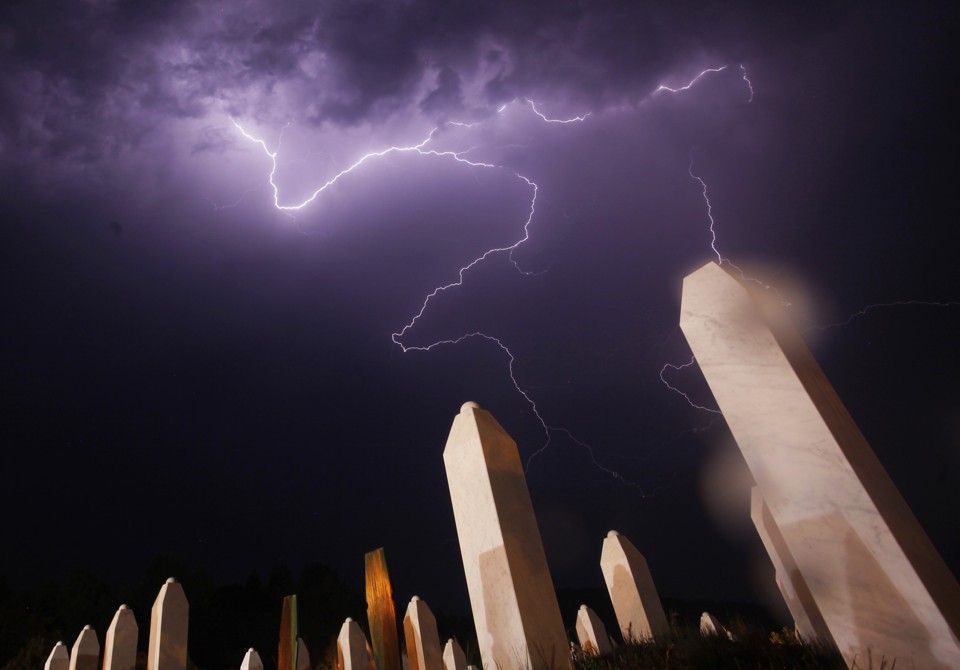It's Never Over 'Till It's Over
"Detainees were forced to rape and engage in other degrading sexual acts with one another. Many Bosnian Muslim women who were unlawfully detained were raped."
"Many of these men and boys [who were murdered] were cursed, insulted, threatened, forced to sing Serb songs and beaten while awaiting their execution."
"The chamber found that the only reasonable inference was that the accused intended to destroy the Bosnian Muslim[s] of Srebrenica as a substantial part of the protected group of Muslims in Bosnia Herzegovina."
"Accordingly, the chamber found the accused intended to carry out the Srebrenica joint criminal enterprises through the commission of the crime of genocide and was a member of the Srebrenica joint criminal enterprise."
Judge Alphons Orie, UN Tribunal for Atrocities in the Balkans, The Hague
 |
| People, including victims, protest in front of the international criminal tribunal for the former Yugoslavia (ICTY) prior to the verdict Photograph: John Thys/AFP/Getty Images |
"This landmark verdict marks a significant moment for international justice and sends out a powerful message around the world that impunity cannot and will not be tolerated."Over 100,000 people died in this brutal conflict following the disintegration of Yugoslavia in the early 1990s. Millions of people were made homeless. Bosnia saw the worst excesses of barbaric slaughter. Bosnian Serb commander Ratko Mladic was hunted for a decade before he was finally taken into custody. His trial, after his 2011 arrest, heard from over 500 witnesses over 530 days, and close to 10,000 exhibits demonstrated the exhaustive search for justice that took place.
John Daluisen, Europe director, Amnesty International
Bosnian Serb forces overran Srebrenica, in an area which had been declared a UN-protected safe haven for its Muslim residents. The Serbian forces had instructions to bus women and children out of the area after they had watched as their husbands, fathers, brothers and sons were separated from the women and taken away. Concluding with the Serb forces undertaking a systematic slaughter of eight thousand Muslim men and boys.
The UN peacekeepers were incapable of intervening and were in fact held responsible, in a 2014 decision for the deaths of desperate men seeking refuge at the Dutch peacekeepers' base near Srebrenica. The Hague Appeals Court found that the peacekeepers should have been aware that the Bosnian Serb troops would murder the men forced to leave the base. The Dutch government in acknowledging the failure of its troops to protect the refugees protested that the peacekeepers had been dispatched on "mission impossible".
That characterization has echoes of Rwanda, when a UN peacekeeping force stationed in the tense atmosphere of Hutu-Tutsi poisonously threatening relations were unable to put a stop to a brief, brutal slaughter of Tutsis and moderate Hutus, even though the man tasked with overseeing the mission, Canadian General Romeo Dallaire, had pleaded with the United Nations to urgently dispatch more men to the mission, and to provide them with appropriate defensive weaponry.
During his trial, Ratko Mladic was at first offhand and relaxed. Under his orders the Serb forces showered shells and snipers' bullets on the defenceless in Sarajevo to conclude in the most horrible massacre to take place in Europe outside the Second World War. The testimony and evidence used to convict him was irrefutable. He was convicted of genocide and other crimes, his sentencing was life imprisonment.
It took 23 years to bring the Butcher of Sarajevo to justice, to account for the atrocities he had ordered to take place. His attorneys have stated they plan to appeal his convictions on ten charges from 1992 to 1995 until the conflict ended. Mladic served former Bosnian Serb president Radovan Karadzic, himself convicted a year earlier for genocide and now serving his 40 year sentence. He too has appealed.
As for former Yugoslav president Slobodan Milosevic, his sentence was an early death in 2006 while awaiting the verdicts reached by tribunal judges following his trial. A kinder death due to health complications took his life in a UN prison cell, in comparison to the atrocities meted out to those he viewed as enemies, across the Balkans,
Justice is done, but when justice is delayed to this extent one must question how well justice has been served. International Courts of Justice have their function, but when the president of Sudan and his elite henchmen were found guilty of war crimes in Darfur, the response was a shrug of indifference; none of them have been held to account. As Arabs they are protected by the larger Arab community of dictators and tyrants.
And if takes a quarter-century to finally bring Bashar al-Assad to trial for destroying Syria, murdering over a half-million Syrian Sunnis in a sectarian war, ruining his country's heritage infrastructure, creating millions of homeless and millions more refugees, many of them flooding Europe with their humanitarian need, what level of justice is that? Even if he were to finally be taken into custody and taken to trial.
The world that fails to respond adequately in prevention of these wholesale atrocities also fails in its responsibility to hold the perpetrators to account.
 |
| Lightning at the memorial center near Srebrenica, Dado Ruvic / Reuters |
Labels: Bosnia, International Criminal Court, Peacekeeping, United Nations
0 Comments:
Post a Comment
<< Home